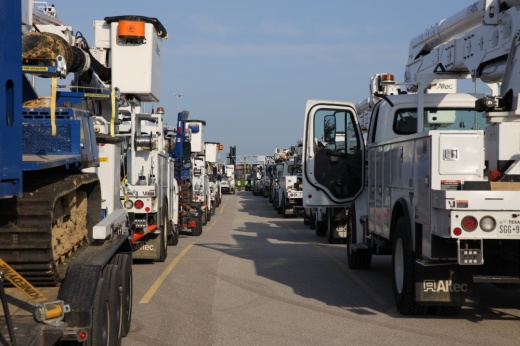Speaking during a regularly scheduled meeting of the Public Utility Commission of Texas, CenterPoint CEO Jason Wells and other company leaders laid out plans to improve communication with customers, solve vegetation issues and better prepare for future storms.
“In times of emergency, our responsibility is to respond quickly, to communicate clearly, to provide accurate information and to restore power as rapidly and safely as we can,” Wells said. “I take personal accountability for the areas where we fell short of customers’ expectations. Most importantly, I want to apologize to our customers. ... While we cannot erase the frustrations and difficulties so many of our customers endured, I and my entire leadership team will not make excuses.”
Company executives backtracked in part on statements made during the PUC’s July 11 meeting, when CenterPoint executive vice president Jason Ryan largely defended the utility’s preparation for and response to the storm.
“We were prepared for this event,” Ryan told Community Impact July 11. “I think the record [power] restoration for more than 50% of our customers just two days after the storm shows that.”
The details
Commissioners emphasized that CenterPoint needed to do more to provide consistent service and regain the trust of its customers, local government and state leaders.
“You're the second-largest utility in the state, operate in multiple states [and] have a lot of experience with hurricanes,” Commissioner Lori Cobos said. “Some of the things that I heard today are things that the company should’ve already been thinking about and doing.”
Wells promised that in the coming weeks and months, CenterPoint would improve communication with its nearly 2.8 million customers; strengthen power lines and and replace approximately 1,000 utility poles; tackle vegetation issues; and acquire more mobile generators to support critical facilities, like nursing homes.
CenterPoint will launch a new “cloud-based” power outage tracker by Aug. 1, senior vice president Tony Gardner said, after the company’s existing outage map collapsed during the storm.
“[The new outage tracker] will accommodate the new level of increased traffic that we can expect during significant storm events,” Gardner said. “This is where our prior outage tracker failed. It was a physical, server-based system which simply could not handle the traffic.”
CenterPoint will also hold daily briefings and frequently update power restoration timelines during major storms and other outage events, Gardner said. The company aims to increase its call center staff by 165% during storms and answer all calls within an average of five minutes, according to planning documents.
Also of note
CenterPoint has faced vehement criticism over its response to Hurricane Beryl. The PUC, which regulates Texas utility companies, is investigating CenterPoint at Gov. Greg Abbott’s request.
Company leaders are also expected to speak before a special Senate committee July 29. The committee, which was formed nine days after the storm hit Texas, will “review what happened and establish why certain electric utility companies appear to have been woefully unprepared,” Lt. Gov. Dan Patrick said.
Commissioner Jimmy Glotfelty said July 25 that the devastating impact of Hurricane Beryl should be “a wake-up call” for CenterPoint and other power companies.
“I know the storm hurt a lot of people... we’ve got folks who died as a result,” Glotfelty said. “This is a wake-up call to every utility around our state that they have to take serious the storms that are facing their systems, the challenges that are facing their systems. Whether it be a [wildfire], or a big storm, or a derecho... you all know your system the best, and y’all have to do better. The customers deserve better.”
During a public comment period at the beginning of the PUC meeting, Houston ISD trustee Savant Moore read the names of 24 people killed by Hurricane Beryl and asked CenterPoint to “show [customers] the same respect they give their shareholders.”
“Today, I come on behalf of everyone in my city of Houston asking you to do the impossible: hold an American corporation accountable. ... It’s not a question of if the next storm is coming [or] if there will be another power outage—it’s when, and will we be prepared? We must act swiftly to protect our communities and prevent further loss of life,” Moore said.





